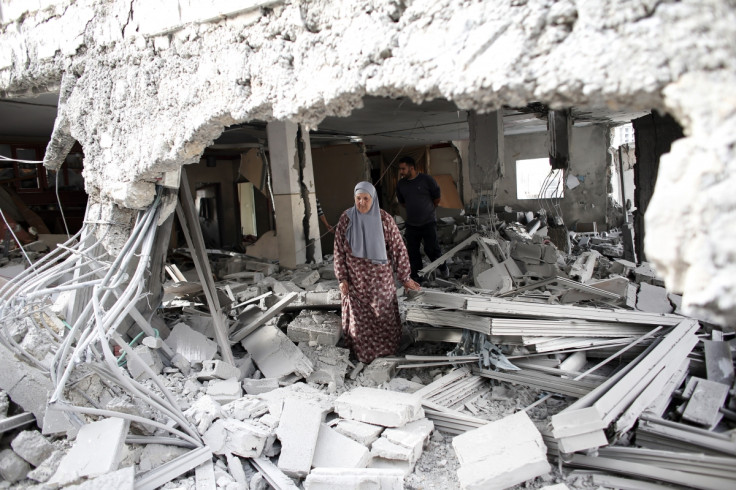Jerusalem violence: Why does Israel bulldoze the homes of terrorists?

Only hours after Mohannad Halabi had stabbed two people in a frenzied attack in Jerusalem on 3 October, his family had begun to empty their family home in Sorda, near Ramallah. As an IBTimes UK reporter spoke to the young man's father, family members were stripping everything from the light bulbs to fittings.
The Halabi family were expecting their home to be bulldozed in retaliation for Mohannad's attack, which killed an off-duty soldier, Aharon Bennett, 21, and Nehamia Lavi, 41, a rabbi. It was the latest in a string of attacks that has seen violence once more flare between Arabs and Jews in Jerusalem and the West Bank.
At time of writing, the Halabi home was still standing, but the Palestinian family were right to be worried. Israel's policy of punitive demolitions of the homes of terrorists is firmly established and, although it was halted in 2005 after the end of the Second Intifada (2000-2005), it has re-emerged over the past 12 months.
On 6 October, the Israeli army bulldozed the homes of the men who carried out a frenzied knife, gun and axe attack on a synagogue in West Jerusalem. In the wake of this week's attacks in Jerusalem, the Israeli government has hinted that it will re-apply the policy to future terrorist attacks.
It was the British who first began the policy of demolition of terrorists' homes during the Mandate of Palestine and before the establishment of an Israeli state in 1948. A regulation was included in a raft of emergency defence regulations enacted by the British High Commission in 1945, and stated that the local authorities could: "seize and destroy houses, structures and land as punishment for illegal acts."
A May 2014 report into the Israeli policy found that the Israeli Defence Forces (IDF) began the process of destroying homes soon after the Six Day War in 1967, when Israel occupied Gaza and the West Bank, destroying 1,400 homes as punishment in the late 1960s.
Demolitions were rare until 1987 before the policy became popular again during the First Intifada, leading to 500 punitive demolitions between 1987 and 1992. But it was the outbreak of the Second Intifada in 2000 that gave a new momentum to the policy. As scores of suicide bombers hit targets in Jerusalem and Tel Aviv, the military began systematically bulldozing their homes.
B'Tselem, an Israeli human rights organisation, estimated that between October 2001 (when Israel began once again to demolish homes as a means of punishment) and the end of 2004, Israel demolished 664 houses as punishment. The Second Intifada also gave birth to a policy of 'precautionary demolitions', under which hundreds of homes in sensitive military areas were bulldozed.
Then in February 2005, the Israeli Defence Minister Shaul Mofaz, abruptly suspended the practice, with Haaretz reporting that the military had concluded that demolitions were not an effective deterrent and in fact did Israel more harm than good. The New York Times quoted an unnamed military official arguing that, in fact, the policy had only been halted because the situation had become calmer.
"House demolitions are just one measure of deterrence, and at present, it doesn't play the same role that it did previously. It's not something we consider necessary at this time," the official was quoted as saying.
But the 2014 report into the policy of punitive demolitions caused a stir by suggesting that the policy of destroying the homes of terrorists was an effective deterrent against further attacks of terrorism. It revealed that an increase in punitive house demolitions leads to a decrease of 11.7% in the number of suicide terrorists originating from an average district, and led to a rise in neighbours and even family members informing on potential terrorists ahead of attacks. The report also found that precautionary demolitions of Palestinian homes actually led to an almost 50% rise in acts of terrorism originating from that area.
Despite the findings, it is likely that any major revival of the policy of punitive demolitions will be contentious, not least because it is a violation of the Geneva Convention, which bars collective punishment. The families of terrorists often have no idea what their family member is going to do and, the logic runs, should not be punished for a crime that they could not have prevented.
Equally the issue of housing and land in Jerusalem is a contentious one, and while there have only been a fraction of punitive demolitions in the city since the First Intifada, the demolition of what the Israeli authorities deem as unlicensed buildings is extremely common. Palestinians claim that the practice is an effort to reduce the number of Arabs living in Jerusalem, while the government argues that Palestinian homes are in violation of planning laws.
© Copyright IBTimes 2025. All rights reserved.





















